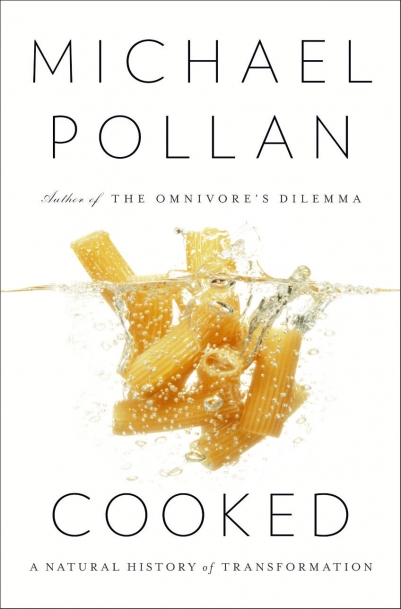Cook, Real Food, From Scratch: Michael Pollan's "Cooked"
Michael Pollan's work has profoundly changed the way we think about our industrial food system, the behemoth that produces the foods found in conventional grocery stores and restaurants. But Pollan is not just a critic. To help people to find more healthful and sustainable alternatives, he's offered the ordinary eater useful tips to help fix the situation – or at least avoid the bad stuff.
Recall his advice from In Defense of Food: An Eater's Manifesto: "Eat food. Not too much. Mostly plants." Or from Food Rules: An Eater's Manual: "If it came from a plant, eat it. If it was made in a plant, don't."
In his latest book, Pollan offers more simple, corrective advice: Cook. Real food, from scratch. "Not every day, not every meal, but more often than we do, whenever we can."
In Cooked: A Natural History of Transformation, Pollan turns his journalist's sensibility and straightforward, thoughtful analysis to how we transform plants and animals into meals and why cooking matters. He maintains that recovering cooking from the industrial factories may be the single most important step anyone can take to help rebuild a healthier, more sustainable American food system.
If, as he's argued in The Omnivore's Dilemma and elsewhere, the industrial food system obscures important relationships with the ecological and natural world, then cooking is the way to restore them.
The book is organized around the four elements – fire, water, air and earth – which correspond to four basic ways to transform raw materials into nutritious, tasty things to eat. Fire is linked to grilling and barbecuing, water to cooking with liquid and braising, air to baking bread, and earth to fermenting, cheese making and brewing.
Pollan joins barbecue pit masters at the spit in North Carolina and New York, kneads with bread makers at Tartine in San Francisco, learns to put up sauerkraut with fermenter extraordinaire Sandor Katz and observes the cheese nun (and microbiologist) Sister Noella Marcellino as she creates a raw-milk, fungal-ripened cheese using techniques practiced in the Auverge region of France since the 17th century. The experiences teach him the basic skills to transform meat, grains, fruits, vegetables and liquids into healthful, nutritious meals.
His explorations in cooking take him all over the world, but there's no place like home, particularly when your home is in Berkeley, California. People familiar with that particular foodie mecca will recognize many of the specialists Pollan works with, including Chad Robertson of Tartine Bakery; Joe Vanderliet, the proprietor of Certified Food and the miller for Community Grains; and Alex Hozven of Berkeley's Cultured Pickle Shop.
Cooked is a personal story, a love letter to cooking and shared meals in Pollan's own life and an inspiration to reconsider cooking's place in our own. Using a wealth of historical detail, literary examples, artisan profiles, scientific study, personal anecdote and references ranging from Homer to Claude Levi-Strauss, Pollan explains how cooking knits us up in a web of social and ecological relationships.
He's funny too, like when he describes his family's experiment with a "Microwave Night," which turns out to be a surprisingly expensive and not particularly efficient or enjoyable every-man-for-himself foray down the aisles of the local Safeway.
For all the waxing enthusiastic about long hours in the kitchen chopping, preparing and putting up, he's also realistic. Pollan recognizes that in many homes it's difficult, if not impossible, to work this sort of cooking into the rhythms of daily life, in large measure because "Time is the missing ingredient in our recipes – and in our lives."
Either the demands of life are such that we just don't have time or even interest in cooking, or we consider our opportunity costs and find we're financially better off to work and earn a wage and avail ourselves of inexpensive prepared food than to stay at home and cook.
His advice? A return to the communal cooking of generations ago, when families, friends or groups of women would gather together to share the labor, and the fruits, of food preparation. Indeed, one of the greatest pleasures of cooking, Pollan claims, are the spontaneous communities that spring up and gather around these special interests, creating intimacy and connection.
If you're inspired by Pollan's experiments and tempted to try some of your own, he includes four basic recipes, each illustrating one of the elements he profiles: pork shoulder barbecue (fire); meat sugo and pasta (water); whole-wheat country loaf bread (air); and sauerkraut (earth).
Cooking converts plants and animals into edible, appetizing meals. The process, Pollan claims, changes us, too – from consumers into producers. Regularly exercising the simple skills described in the book to produce some of the most basic necessities of life – bread, fermented foods, braised meats – can increase self-reliance and freedom, reduce dependence on large corporations to cook for us, and build community, creating the possibility for living a more healthy, happy, nourishing life.
Cooked: A Natural History of Transformation
by Michael Pollan (Penguin Press HC, 2013)
http://michaelpollan.com/books/cooked/




